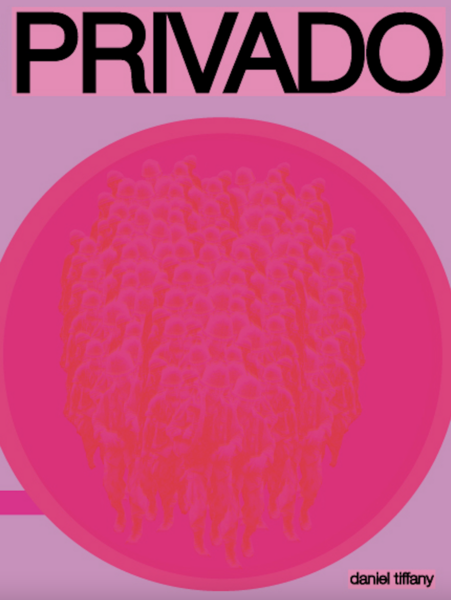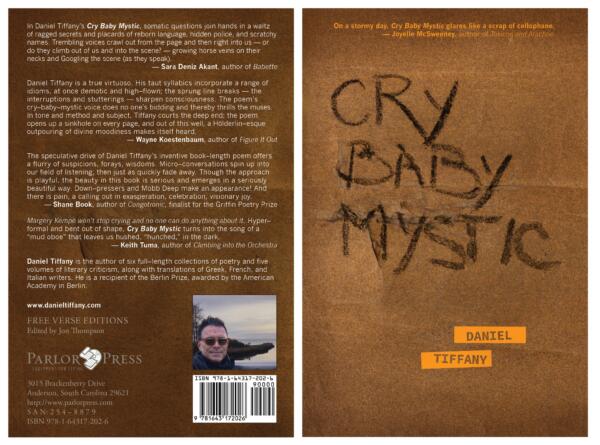
Paul Cunningham: What was the impetus behind Privado?
Daniel Tiffany: Privado was one of two different, but related, manuscripts I was working on at the same time in 2008, both published in 2010. The second book, The Dandelion Clock, was published by Susan Schultz’s Tinfish Press, which features vernacular writing from the Pacific Rim. I can see now that the two books were related experiments in drafting what I would call tonal compositions involving my own writing plus a fully-stocked “rack” of external texts. Exercises in fabrication and producing a synthetic voice. Each poem in The Dandelion Clock begins with a scrap of Middle English lyric (anticipating Caroline Bergvall’s and Julian Talamantez Brolaski’s “meddling” with archaic diction), calling forth other idioms and dialects.
In contrast to The Dandelion Clock, though, the verbal materials in Privado are consistently ugly and sour. Totally unappealing. A perfect book for Action! But at the time, I really wasn’t sure where to turn for publication. I had recently learned about Action Books by following a trail from a review that Joyelle had written of my critical book, Toy Medium, and I thought, hey, let’s try Action!
PC: What was one of your favorite poems or passages from Privado and why?
DT: Privado mounts a verbal charivari, rooted in the drill songs (called “joadies”) chanted by soldiers in basic training. Consisting mostly of grunts, “erps” and profanity, the joadies in my book are splattered across a range of other texts, including dialogue from YA novels, garbled translations of Japanese fashion magazines, and biblical homilies. The idea was to listen to how soldiers’ work-songs (like stadium chants) might resonate with contemporary “dead” languages in the civilian world. Here’s a snatch of one of the “cadences”:
Stops while he still
At it.Sold at auction.
I am a genuis
Truman Capote
Scribbled on a matchbook.Sprinkle goofer dust
By your bed
Against the incubus.Mile one
Havin’ fun
Mile two
Good for you
Mile three
Good for me
Mile four
Want some more
Mile five
Keep me aliveThe exemples are contagious.
Strek him the bridle,
hold him that reins sharters.
Pique strongly,
Make him to marsh.Watch it.
He is mad to bind,
he turns as a weath turcocle.
PC: Can you tell us about any new or recent projects on the horizon?
DT: I’m starting work on a new project called Logophobe, a text mingling poetry and theory—lord knows how!—about writing from within a fear of language (with formal debts, in part, to Hanne Derboven, the German conceptualist). And I’ve just published a book-length poem (written in syllabics), Cry Baby Mystic, hovering around the figure of Margery Kempe, an illiterate, medieval mystic, who dictated what is thought to be the first autobiography in English. Your pal, Madison McCartha took me for a wild ride about the book in a recent conversation published in Bomb.
PC: Who are you currently reading?
DT: Oh, a bunch of stuff trying to get me on track for this new project: Christine Hume’s Saturation Project (especially Hum); Sophia Dahlin’s Natch; odds and ends by Gertrude Stein; Aaron Kunin’s Cold Genius; a story by Samuel Beckett, First Love; Maurice Blanchot’s essays; Avital Ronnell’s theoretical intervention, Stupidity; Mohamedou Ould Slahi’s redacted Guantanamo Diary; Stacy Doris’s book, Fledge (a sequence of end-of-life poems written entirely in syllabics).
PC: What do you expect from poetry being written in 2021?
DT: I don’t think of poetry as having an applied function, though I do like the task of occasional poems—writing that belongs to, or helps to bring about, a particular event. Poetry as accessory. I do hope poetry will continue to creep beyond our expectations—wherever that may lead—and defy the various programs that have been set out for it. Don’t let nobody else make up your mind about it!
PC: What advice would you give to emerging poets?
DT: Don’t let nobody else make up your mind about it!

